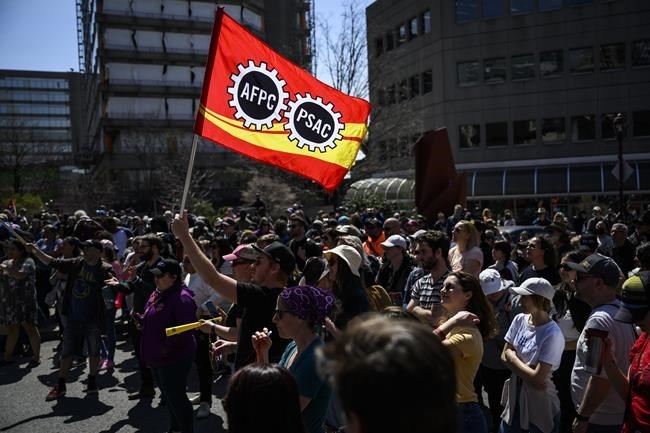OTTAWA — The federal government tabled a new contract offer to the Public Service Alliance of Canada Friday, as thousands of federal workers strike remained on strike for the tenth straight day.
Both the union and a spokeswoman for Treasury Board President Mona Fortier confirmed the offer, which is the first sign of any progress in the talks since the union said things were at a stalemate on Wednesday.
Fortier's press secretary Monica Granados called it a "comprehensive offer" but provided no further details.
In a written statement the union confirmed receiving the offer as talks resumed Friday.
"We hope to continue bargaining this weekend in order to reach a fair deal," the statement said.
Prime Minister Justin Trudeau said Friday the government is making "serious offers" in a bid to bring a strike of its largest public-sector union to an end.
More than 100,000 members of the Public Service Alliance of Canada walked off the job April 19 after the union and government failed to reach new contract deals.
The contracts affect 155,000 federal workers in total but the government deemed about 46,000 of them as essential workers who are not taking part in the job action.
The PSAC contracts expired in 2021.
Earlier this week, PSAC national president Chris Aylward said he wanted Trudeau to get directly involved in the negotiations, which he said have hit an impasse because the government hadn't budged from its latest wage increase offer of nine per cent over three years.
Trudeau, who was in New York City this week for a trade trip, said he is involved.
"I have been directly and intimately involved in the negotiations, in hearing about what discussions are going on," he said, responding to a question from a reporter at a news conference.
He said he is confident the strike can be concluded with a negotiated deal. The government could end the strike with back-to-work legislation, but Liberal ministers have refused to even entertain a question about using such a tool.
"I have deep faith in collective bargaining as a process," Trudeau said. "We know that our negotiators are putting forward serious offers."
In a tweet Friday morning, Treasury Board President Mona Fortier said both sides were talking at the table.
"The government is committed to negotiating a fair, competitive and reasonable agreement," she said.
The government's last published wage offer was to be backdated to 2021, with a 1.5 per cent increase that year, followed by 4.5 per cent raise in 2022 and another of three per cent in 2023.
Fortier has repeatedly said that is the wage offer recommended by the Public Interest Commission, a panel appointed by the Federal Public Sector Labour Relations and Employment Board last year to help the two sides reach an agreement.
It is not clear if today's offer included a bigger wage increase.
The union initially asked for 13.5 per cent over the same time frame and while it says it has adjusted that ask, it has not said what the new request is.
In a tweet Friday morning, PSAC said it wants a raise that keeps up with inflation and insists the public sector hasn't received a raise in line with inflation in more than 15 years.
"Thanks to inflation rising by 11 per cent since 2021, federal public service workers' wages are worth the same as they were in 2007," the Twitter statement said.
Early Friday, picket lines were a little more sparse in downtown Ottawa than they had been earlier in the week, when union members flooded the Parliamentary Precinct in a bid to ramp up the direct impact of the strike.
A handful of workers in PSAC strike pinneys remained outside the doors of many federal office buildings, limiting entry to one person every five minutes.
But a larger gathering took place on one of the bridges across the Ottawa River to Gatineau, Que., where PSAC members also marked the National Day of Mourning for workers killed or injured on the job.
"We are taking the bridge," chanted a large group of picketing workers as they marched across it.
Aside from pay, other issues described by the government as sticking points earlier this week include the flexibility to work remotely, the reduction of the government's use of outside contractors and the implementation of seniority rules in the event of layoffs.
A majority of the PSAC workers were directed to work from home in March 2020 when COVID-19 began, and only a limited number had returned to in-person work in the years since. In December, Fortier issued a new directive requiring all workers to be in the office at least two days a week, but the government's unions pushed back, calling the directive unfair.
They want a policy on remote work included in their contracts.
Fortier said in an open letter earlier this week that she was offering to do a joint review of the telework policy with the unions.
Jennifer Carr, president of the Professional Institute of the Public Service of Canada union, said that is a good start but it's not good enough.
"We need a binding commitment in a collective agreement, because we have seen too many instances where the employer has abandoned its promises or ignored the process after signing a memorandum of understanding with us," she said.
Carr said the government's consultation on the return-to-office directive was "abysmal" and didn't listen to the government's own advisers.
As the strike continues, 91原创s are facing a wide range of federal service disruptions, including an inability to process immigration and passport applications.
About 35,000 of the affected workers are employed at the Canada Revenue Agency which has limited the access 91原创s have to get help filing their taxes ahead of the deadline on May 1.
This report by The 91原创 Press was first published April 28, 2023.
Mia Rabson, The 91原创 Press



